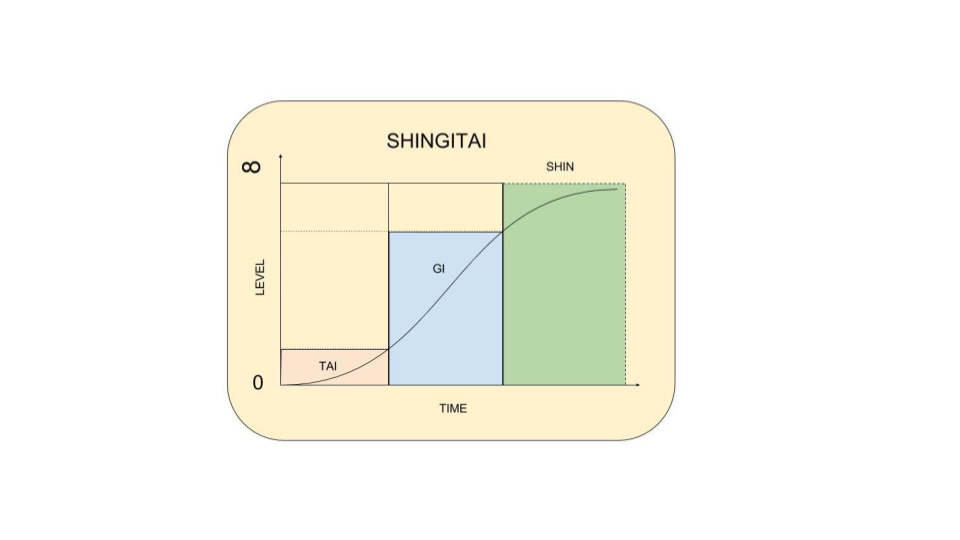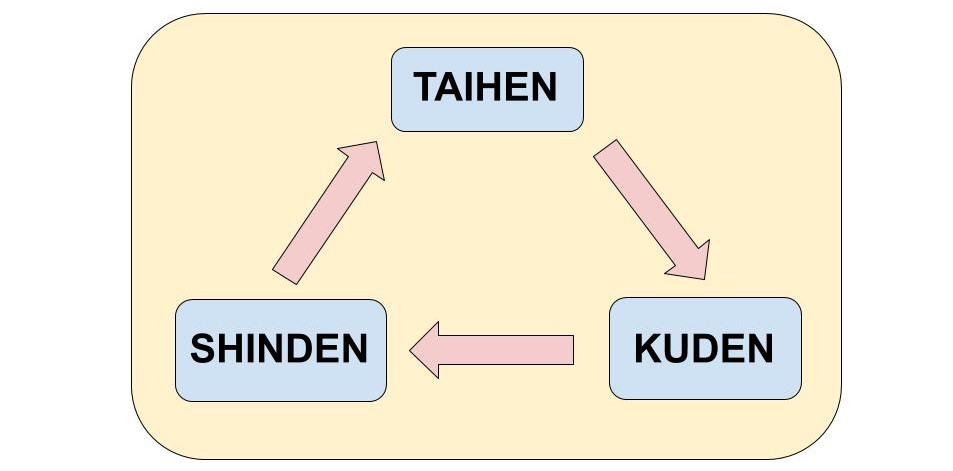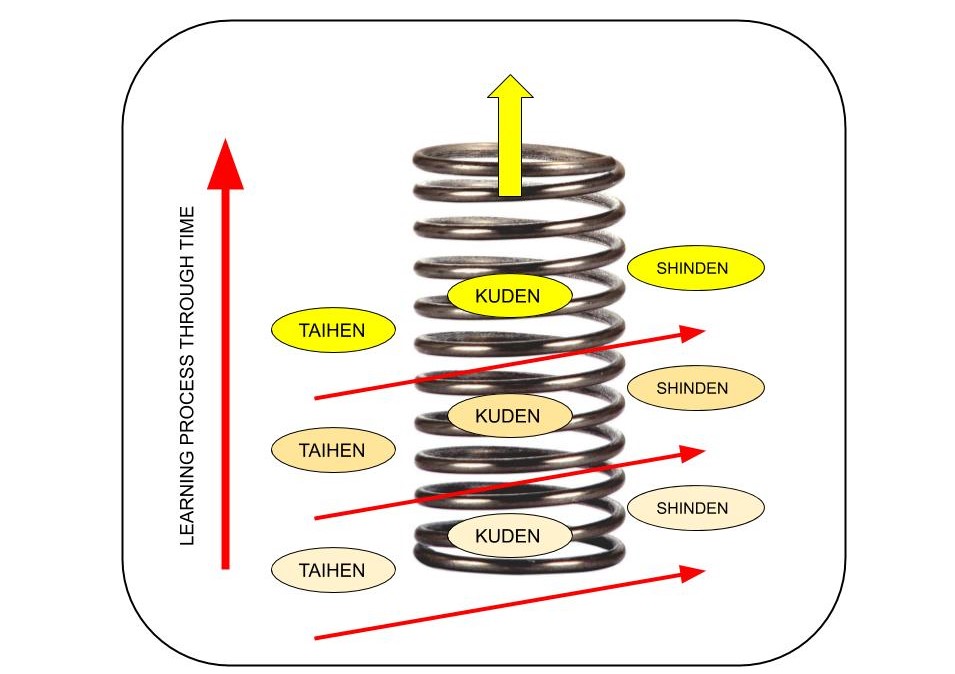From Shiro Kuma by kumafr
 This week should have been Senō sensei’s birthday. And thinking about his classes at the honbu, it reminded me of the soft precision he used in his teachings. He was also the only Dai Shihan asking to be hit, to show the perfect timing. His Taijutsu was impressive, and he was never afraid of making mistakes. We should be doing the same.
This week should have been Senō sensei’s birthday. And thinking about his classes at the honbu, it reminded me of the soft precision he used in his teachings. He was also the only Dai Shihan asking to be hit, to show the perfect timing. His Taijutsu was impressive, and he was never afraid of making mistakes. We should be doing the same.
Somehow it resonates with my recent article on failure. You must make mistakes to improve our Taijutsu. (1) I spoke about Shippai, failure. But Shippai also means a mistake. (2) As often in Japanese, an action (mistake) can be a result (failure).
The moment you decide to change, you make errors. And as a consequence, you improve your skills. Albert Einstein said, “anyone who has never made a mistake has never tried anything new.” We have to stop being afraid of change, and always try new things. This is the path Sensei is showing us to develop our Taijutsu. Accept it today, even if I know how hard it is to turn a decision into action.
Humans are reluctant to leave their comfort zone, they avoid trying new things. Humans love routine and hate changes. Even though we know that in life (or in a fight) everything is about accepting change. Did you know that “Henka” that we translate by “variation” also means “the beginning and the end of change?” (3)
Because we make mistakes, we can correct them and get better at our Taijutsu. Any new learning, or any further action we take, will see us fail. Accepting our errors is the best way to excel one day. With each try, we change the form until we reach the correct way to do it. What is wrong becomes good. But this way to train demands to be relaxed. This is why stiffness in the body or in the mind while training cannot be. Hatsumi Sensei often tells us to relax. Only when you release all tensions, that change is possible.
In an ancient interview, Sensei explained that “what is not natural is not in harmony with life. Life changes constantly, everything is naturally evolutive, because nothing is static. In this perspective, everything that tends to remain static is not natural. And thereby, because it goes against nature, is doomed to disappear for it is fruitless.” The nine schools survived all these centuries because they didn’t remain static.
Humans learn new things because they make mistakes. The late Senō sensei used to tell us that when learning a new form, we make big mistakes at first. And then, through repetition, we make smaller ones, until they nearly disappear. Step by step, we get the correct movement and get it right.
“Machigai” also means a mistake. (4) So please accept “Machigai” and don’t “Machigae,” “wait to change.” Do it now! (5)
To accept change is the key to adaptation, and to natural movement
____________________________________________
1 https://kumablog.org/2019/12/05/are-you-a-failure/
2 失敗, Shippai: Failure; mistake; blunder
3 変化, Henka. change; variation; alteration; mutation; transition; transformation; transfiguration; metamorphosis
4 間違い, Machigai: mistake; error; blunder. Accident; mishap; trouble. Improper conduct; indiscretion
5 待ち替え, Machigae: Machi, waiting; waiting time. Gae, change; alteration; substitute.
Join the KOI Community today at www.koimartialart.com. And stream 150 Gb of Bujinkan techniques!
…
Read More The Bujinkan created by Sōke is like a treasure, but few practitioners understand what it is, or how much it is worth. There is a Japanese saying for people not valuing what they have. It is “Neko ni koban,” as our “casting pearls before swine.” (1)
The Bujinkan created by Sōke is like a treasure, but few practitioners understand what it is, or how much it is worth. There is a Japanese saying for people not valuing what they have. It is “Neko ni koban,” as our “casting pearls before swine.” (1)
 , I Shin Den Shin. Así recibí de usted querido Sōke sus enseñanzas, sólo agradecer todo el cariño brindado a través de los años. Espero sepan entender, ya no vengo a 日本 a practicar, sólo vengo a verlo a ud 先生, ver sus ojos, sentir su inmenso amor, y saber que está bien. Sólo ud 先生 es mi faro. Y no es por que no pueda seguir aprendiendo, de todos puedo y debo aprender. Pero estoy aquí por lo más importante, usted querido Maestro. Agradezco a mis Hermanos y amigos, y les dejo un pedido, cuiden a 先生 por favor. Makoto de Gozaimasu.
, I Shin Den Shin. Así recibí de usted querido Sōke sus enseñanzas, sólo agradecer todo el cariño brindado a través de los años. Espero sepan entender, ya no vengo a 日本 a practicar, sólo vengo a verlo a ud 先生, ver sus ojos, sentir su inmenso amor, y saber que está bien. Sólo ud 先生 es mi faro. Y no es por que no pueda seguir aprendiendo, de todos puedo y debo aprender. Pero estoy aquí por lo más importante, usted querido Maestro. Agradezco a mis Hermanos y amigos, y les dejo un pedido, cuiden a 先生 por favor. Makoto de Gozaimasu.





